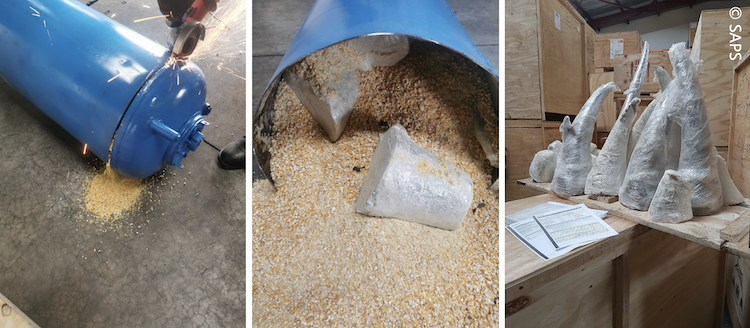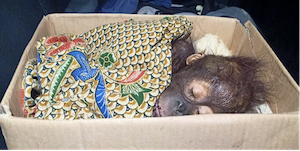On the Trail n°31 – October-November-December 2020
1,294 events with references, along with analyses, 469 iconographic documents, maps and historical archives.
222 pages (pdf – 12.2 Mo)
Winter 2020, curfews and lockdowns. Some are poaching for survival or for a bit of money, others by idleness. Zebra meat dries on ropes in the savannah. In the United States, 17-year-old teenagers are poaching deer with the spotlights of their parents’ GMC truck. There are traps everywhere and of all kinds from north to south, east to west, on land and at sea. No wildlife can escape them, from the biggest ones like bears to the smallest ones like Berthe’s mouse lemur. Birds by hundreds of thousands are captured to brighten up the stay-at-home holiday season. The Ganges river dolphins are lynched, people need to unwind.
469 photos and illustrations: among the most beautiful are the blue sheep (foothills of the Himalayas, India) and the rock ptarmigan in winter and summer uniforms. Among the most surprising, Benozzo Gozzoli’s painting evoking hunting with cheetahs in Italy.
Extracts:
“Ivory is one of the only raw materials in West Africa to be subjected to processing before sale.”
“Americans are welcome in Pakistan when they pay 82,000 US$ for the privilege of killing a markhor. With the help of at least 12 guides, one of them shot one almost at point blank with a bow, a world first it seems. It is after 8 days of tracking in the mountain and without the help of drones that the feat was accomplished.”
“Breeding in China. The post-Covid revolution” p.177.

South Africa, December 14, 2020. Seizure of 17 rhino horns in a hot water tank supposedly containing chicken-feed. Destination Malaysia.
Some prices:
Baby chimpanzee: 3,000 US$
Marmoset: 250 US$
Pangolin, dead or alive: 4,670 to 20,610 US$. Scales: 271 US$ each, 1,520 US$/kg, 9,125 US$ /kg
Rhinoceros horn: 18,563 US$/kg
Mammoth ivory: 170 to 330 US$ /kg
Elephant ivory: 2,000 to 2,500 US$/kg in China
Tiger: 74,000 US$ eviscerated, 48-72 US$ per bowl of soup
Leopard: 7,000 and 13,000 US$ per skin
Bats: 3 US$/kg of meat
Vulture, dead or alive: 60 to 140 US$
Peregrine falcon: 10,000 US$
Humboldt penguin: 11,600 US$ per pair
Sea turtle: 15 US$ per egg
Totoaba swim bladder: 20,000 US$/kg
Shark fins: 100 and 950 US$/kg
Sea cucumbers: 1,000 US$ per individual, 1,360 US$/kg
Seahorses: 1720 US$/kg
Some weight:
26 kg of teeth, 1,979 kg of cartilage and bones, 26.2 tonnes of meat and 62.5 tonnes of shark fins seized during October, November and December 2020.
Some tenderness :
Tribute to Jenny and Jimmy Desmond (Liberia)
Some solidarity:
Elephants fill with water a dry well where one of their fellow elephants had fallen before giving way to rescuers (India).
Some sanctions :
8 months in prison for a tarantula trafficker (China).
12 months in prison, of which 6 months are suspended, for a trafficker of coral, parrots, sawfish, monitor lizard skins and ivory (The Netherlands).
12 and 18 months in prison for trafficking in sea turtles (Mayotte, France).
12 months in prison for trafficking in elephant tusks (Benin).
32 months in prison for theft from a zoo and attempted selling of endangered birds (United Kingdom).
Acquittal of an illegal holder of 31 geckos (France).
Six-month suspended prison term, one year probation and obligation to repopulate the river with 5,760 fry for electrofishing (China).
A fine equal to 800,000 US$ for a property developer who destroyed a bat habitat (United Kingdom).
Three-year suspended prison term and 120 hours of compulsory work for selling sturgeon meat (Russia).
Two years of probation for turtle trafficking (USA).
800 US$ fine for keeping reptiles (Brazil).
New rumours:
Nile crocodile genitals and sika deer penises and testicles heightens libido and cure tinnitus.
Bear bile cures Covid.
Practical advice if you encounter a puma (United States of America) :
1 – Anyone who comes across a puma sleeping or relaxing should remain calm and leave the area. If the animal does not see you, walk away.
6 – Another way people can be extra cautious if they can listen out for birdsong. They’ll make a warning call. That can expand the way you can observe.
“On the Trail“, the defaunation magazine, aims to get out of the drip of daily news and to draw up every three months an organized and analyzed survey of poaching, smuggling and worldwide market of animal species protected by national laws and international conventions. “On the Trail“ also relates ongoing trials and the evolution of regulations and sanctions.
See also the “Atlas of the Business of Endangered Species”, Robin des Bois, Editions Arthaud, October 2019.
“On the Trail” n°31
http://www.robindesbois.org/wp-content/uploads/ON_THE_TRAIL_31.pdf
On The Trail has been carried out by the NGO Robin des Bois since 2013 with the support of the Brigitte Bardot Foundation, the Franz Weber Foundation and the French Ministry of Ecological and Solidarity Transition.
 Imprimer cet article
Imprimer cet article












